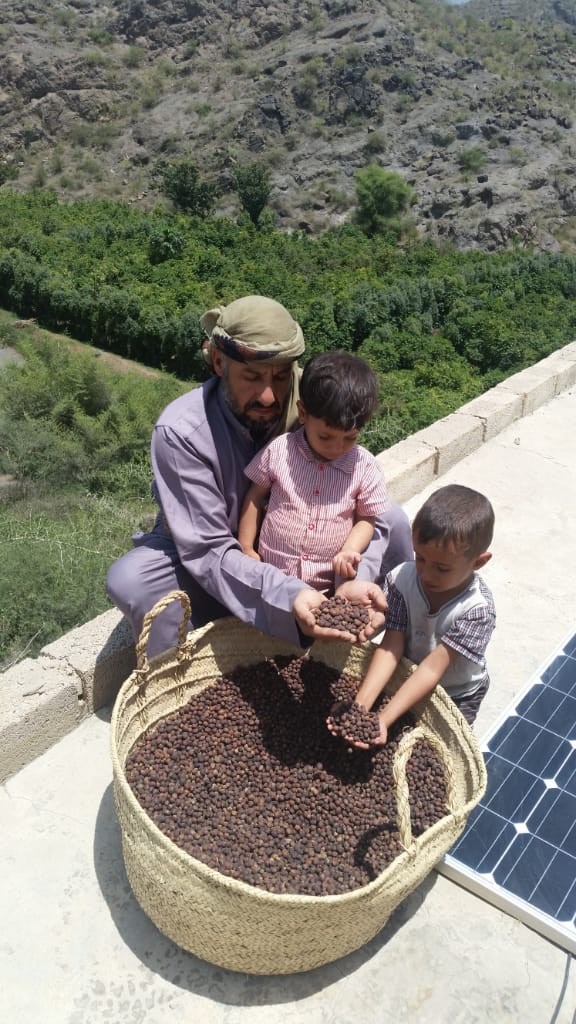Speeches Shim

Yemen's Coffee Farmers Brew New Hope from an Old Crop
“After seeing my coffee income tripling as a result of adopting YESS Livelihoods coffee harvest and postharvest practices, I have decided to gradually replace my qat fields with coffee.” – Hameed
In the jagged hills of Bab Al-Khalsa – Wadi Baqlan village in Sana’a Governorate, Hameed grows coffee as his main crop, along with qat and a few cereals, to support his family of 10. Like his elders before him, Hameed used to harvest his coffee crop using traditional methods, picking a haphazard combination of premature yellow and green coffee cherries, then storing them in a location that was poorly sealed and unprotected. To dry the coffee beans, Hameed would lay them out on the ground or on the roof of his house, where they were exposed to the sun, heat, wind, dust, kitchen fumes, and any marauding rodents or bugs. Once dried, he would store his coffee beans in plastic bags next to his animal sheds, and adjacent to the kitchen smells of garlic and onions.
This season, Hameed applied new harvesting and postharvest practices acquired through hands-on training offered by USAID’s Yemen Economic Stabilization and Success (YESS) program. Instead of picking the unripe fruit, he waited to harvest them until the coffee cherries had attained their full red color, and then placed them in a clean basket to protect them from damage. Hameed dried his coffee beans in drying beds instead of on the ground and, for the first time, applied sorting and grading methods promoted by YESS trainers.
The results led to higher quality production and translated into far greater returns. The improved harvest brought in a per-kilogram (kg) price of 3,600 Yemeni Riyals (about $6.50) – more than twice the 1,400 Yemeni Riyals ($2.55) per-kg value of his previous year’s crop. With enhanced coffee production management gleaned from the USAID training, Hameed also increased his yields by 10 percent, from 2,200 kg to 2,420 kg. The combined effect of better quality and higher production led to a nearly threefold increase in his annual income from coffee production– which rose from $5,610 in 2018 to $15,730 this year.
With the extra income, Hameed has been able to pay for his children’s education and improve his family’s nutrition and living conditions. In addition, he is investing his profits in expanded production, buying 2,400 square meters of new land, reclaiming another 1,000 square meters of unused land, and building a water tank for his coffee fields. He is also slowly replacing his production of qat – a water-guzzling crop that produces a popular stimulant – with coffee trees.
Through YESS, USAID has trained 746 coffee producers to enhance their skills in coffee harvesting, drying, storage, transport, and handling. But the impact of the program is also going further to ensure that gains for coffee farmers like Hameed are widespread and sustainable.
Coffee was once the pride of Yemen and a central part of its economy. From the 16th to the 18th century, Yemen traded coffee on a global scale, supplying nearly all the beans consumed across Europe and the Ottoman Empire. Still today, some of the most appreciated varieties of C. arabica coffee originate from Yemen. But the challenge for Yemeni coffee producers is their disconnect with domestic and international markets.
Thus beyond the technical training it provides to the farmers, USAID is also establishing linkages between coffee producers, processors, entrepreneurs, and traders to better tap into more lucrative markets. To further strengthen the coffee value chain, the initiative is targeting ways to bring a “premium certified” Yemeni coffee to regional and international buyers. The USAID YESS market linkage team is working to establish sales agreements between Yemeni coffee traders and farmers and coffee importers in Cairo, Egypt, and Amman, Jordan.
Coffee production provides direct income to nearly 90,000 small-scale farmers in Yemen. USAID is effectively rebuilding economic prospects for farmers like Hameed that lay the groundwork not only for individual self-reliance but also for economic resilience to help fuel long-term economic growth for this war-torn country.
USAID’s Yemen Economic Stabilization and Success (YESS) program supports self-reliance and resilience by facilitating trade, increasing employment, supporting sustainable livelihoods, and stabilizing crucial macroeconomic policy issues. In the past year, YESS has leveraged private-sector commitments to generate about 3,500 jobs for at-risk populations, built international stakeholder support for a trade facilitation agreement, provided livelihood support to over 3,500 farmers, and assisted the Central Bank of Yemen to articulate major macro-financial reform challenges and support needs. The program is part of the USAID Middle East Economic Growth Best Practices Project, which provides the Middle East Bureau, Missions, and Operating Units with tools to support economic growth and reform across the Middle East and North Africa.

Comment
Make a general inquiry or suggest an improvement.